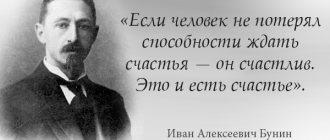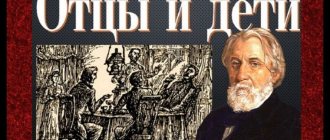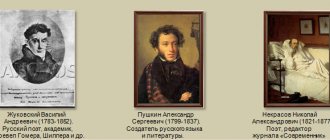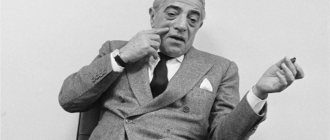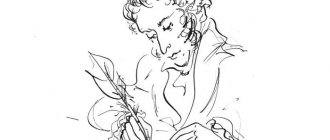Table “Relationship between Chatsky and Famus society” (comparison)
1 answer
The relationship between Chatsky and Famus society can be presented in the table.
The people have no rights, they are sold by those whom they faithfully served: “...he exchanged three greyhounds for them,” “...sold out one by one.”
Servants are the lowest part of people, they can be insulted, scolded, humiliated: “You, Filka, you are a straight block of wood... a lazy grouse.”
“To work you, to settle you”
Chatsky is ready to serve, but only “the cause,” and “not individuals.”
He considers the ideal life of the nobility, in wealth, at the palace:
“...either on silver or on gold; one hundred people at your service; All in orders..."
“What kind of aces live and die in Moscow,” “...he knew how to deliver the key to his son.”
The new century is more enlightened, it allows you to think, think, reason, build your destiny. This pleases Chatsky: “Everyone breathes more freely and is in no hurry to fit into the regiment of jesters.”
Teaching for Famusov and his society is a terrible plague that violates the foundations of the nobility. Famusov is against books, especially in raising daughters: “Learning is a plague, learning is the reason that now, more than ever, there are crazy people and cases , and opinions." “French books make her sleepless, but Russian books make me sleepy.” The phrase clearly characterizes the attitude: “Take all the books and burn them.”
Chatsky leaves the service: “I would be glad to serve, it’s sickening to be served.” He cannot bend and pretend: “As he was famous for, whose neck bent more often.” It’s funny for a young man to observe his zeal for rank: “...They pounded on the floor without regret!”
Famusov loves sycophants, loves to serve: “When it is necessary to serve, and he bent overboard”
He believes that in Russia there is an excessive passion for everything foreign, and the original Russian is fading into the background: “Will we ever be resurrected from the foreign power of fashion?”
Foreigners are a special people. They are welcome, doors are always open for them.
Chatsky does not prioritize wealth; what is important to him is the person himself, his intelligence and ability to communicate.
Wealth is the most important thing that the groom of Troekurov’s daughter should have; it would be nice to have a son with an “order in his buttonhole.”
Love cannot withstand separation: “... love ends whoever goes away for three years.”
A family is members of the same social circle: “It’s an honor for father and son.”
An intelligent person is not looking for a “warm” place or a promotion. He is passionate about science and likes to learn new things. God Himself arouses in him “...the fervor for creative, high and beautiful arts...”.
The mind is needed for service, for moving up the career ladder. Smart - businesslike. Reasonable, but poor people cannot be accepted into a noble family: “Let yourself be known as a reasonable person, but they will not be included in the family... here they also value the nobility.”
Source
Chatsky's attitude to serfdom and the people
It is noteworthy that the author of the work never spoke out for or against the abolition of serfdom. He “conveyed” his ambiguous position to the main character of the comedy.
Andrei Chatsky has modern judgments, speaks openly about existing problems, and easily enters into disputes.
At the same time, in the work the hero practically does not touch upon this topic. The current situation in the country at that time, which was extremely acute, does not allow us to treat serfdom in any way.
The theme is touched upon indirectly in one monologue and can be seen in several statements by the character. Based on these few quotes and studying the hero's final monologue, we can say that he condemns serfdom. Calls him slave.
Rather, the hero ridicules the landowner who: “exchanged three greyhounds for a crowd of servants.”
Chatsky favors the people, saying that people in Russia are kind and even cheerful.
Love for the common people, hostility to the nobility and unwillingness to “serve”
distinguishes Chatsky from Famusov and members of his society.
Do you know the answer?
Items
New questions
Site rating
- 1. Daniil Vasiliev 450
- 2. Alexander S 445
- 3. Daria Zavgorodnyaya 225
- 4. Igor Proskurenko 174
- 5. Isabella Bevz 136
- 6. Herodotus Abazbek 127
- 7. Vladimir Kuntin 106
- 8. Anton Kovalevich 98
- 9. Nastya Nikitina 95
- 10. Niya B 94
- 1. Kristina Volosocheva 19.120
- 2. Ekaterina 18,721
- 3. Yulia Bronnikova 18,580
- 4. Darth Vader 17,856
- 5. Alina Saibel 16,787
- 6. Igor Proskurenko 15,904
- 7. Maria Nikolaevna 15,775
- 8. Larisa Samodurova 15,735
- 9. Liza 15,165
- 10. TorkMen 14,876
The most active participants of the week:
- 1. Victoria Neumann - bookstore gift card for 500 rubles.
- 2. Bulat Sadykov - bookstore gift card for 500 rubles.
- 3. Daria Volkova - bookstore gift card for 500 rubles.
Three lucky people who passed at least 1 test:
- 1. Natalya Starostina - bookstore gift card for 500 rubles.
- 2. Nikolay Z - bookstore gift card for 500 rubles.
- 3. David Melnikov - bookstore gift card for 500 rubles.
The cards are electronic (code), they will be sent in the coming days via VKontakte message or email.
Source
Uncultured, uneducated Russia at the beginning of the 19th century
According to the famous philosopher Berdyaev, the country of Russia was a “huge, vast peasant kingdom,” led by the local nobility, “poorly cultured and lazy,” as well as a powerful bureaucratic apparatus. At the same time, the layer of educated and cultured people was insignificant. This is the answer why Chatsky’s expressed attitude towards education causes such negativity in Famus society.
After all, even Emperor Alexander I, who came to power as a pro-Western liberal, led the anti-European opposition at the time of writing Griboyedov’s immortal comedy, and approached religious mysticism.
Chatsky and Famusov’s attitude to love, marriage and happiness
Attitude to the people and serfdom The current century: Chatsky opposes those people who are the pillars of noble society, opposes the orders of the Catherine century. The past century: Famusov is a defender of the old century, the heyday of serfdom.
Attitude to the ideals of the current century: Chatsky’s ideal is a free independent person, alien to slavish humiliation. The past century: Famusov’s ideal is a nobleman of the Catherine century, “hunters of indecent behavior.”
Attitude to education The current century: Chatsky defends the right to serve the education of the country through scientific work, literature, and art. The past century: Famusov opposes books and sees harm in teaching.
Attitude to service The current century: Chatsky leaves the service because he wants to serve the Motherland, and not serve his superiors. The past century: Sees service to individuals rather than to business as a source of personal benefits.
Attitude towards the foreign The current century: Stands for the development of national culture, for the unity of the intelligentsia with the people, a high opinion of them. Opposes blind slavish imitation of foreigners. Past century: Disdainful of everything popular and national, slavishly imitates the external culture of the West, especially France, neglecting its native language.
Attitude to wealth and ranks The current century: Sees the value of a person in personal merits. He defends freedom of thought, recognizes the right of every person to have his own beliefs and to express them openly. The past century: Evaluates a person by his origin and the number of serf souls. The opinion of aristocratic society is sacred and infallible.
Attitude to love, marriage, happiness. The present century: Sincerity of feeling. The past century: Love is a pretense, a marriage of convenience.
Source
Griboedov is one of the three most educated people in Russia at the beginning of the 19th century
And Alexander Sergeevich was the most educated man of his time, knowing most of the languages of Europe and Asia. It’s amazing to be able to communicate fluently, in addition to your native language, in German, French, Italian, English, Greek, Turkish, and Arabic. In addition, he rendered great service to Russia as a virtuoso diplomat. The peace treaty he developed with Persia gave Russia 2 khanates. And in this sense, as his contemporaries argued, Griboedov alone was worth an army of 20,000. Despite the disgrace, even Emperor Alexander I could not ignore the efforts of the diplomat without attention and rewards. That’s what strength his education and clear mind represented!
Is it surprising that the theme of enlightenment was heard in the main work of Alexander Griboyedov’s life? Chatsky’s attitude towards education essentially echoes the point of view of the diplomat-playwright himself. However, first we should imagine what Griboedov’s Russia itself was like.
Famusov’s views are opposite to Chatsky’s views
Chatsky’s zealous attitude towards education and enlightenment, in which a pro-state position is felt, collides with the inert, primitive position of Famusov. One feels that he was personally taught at one time (as Pushkin aptly said) “somehow.” However, this Moscow nobleman with an average fortune, not bothering himself with reading books, spares no time on empty secular formalities. And what is characteristic is that his inner circle of acquaintances, nobles and officials, agrees with him.
Chatsky’s education, unlike Famusov and Molchalin, corresponds to the standards of the “current century.” The author does not go into details, but mentions that Alexander Andreevich went beyond the cordon to “gain his wits.”
Help me fill out the table based on Griboedov’s work “Woe from Wit”
We need quotes from Chatsky and Famusov society about the attitude 1. to the people and serfdom 2. to ideals 3. to enlightenment 4. to service 5. to foreign 7. to marriage, to love 8. the meaning of the word “mind”
That is, for each point there are 2 quotes. Please help, I really need it! Thank you in advance)))))))
“The present century” and “the past century” according to the following characteristics: 1. Attitude to wealth, to ranks 2. Attitude to service 3. Attitude to foreign 4. Attitude to education 5. Attitude to serfdom 6. Attitude to Moscow morals and pastime 7.attitude towards nepotism, patronage 8.attitude towards freedom of judgment 9.attitude towards love 10.ideals.
The present century: 1. “They found protection from court in friends, in kinship, by building magnificent chambers where they indulge in feasts and extravagance, and where the most vile traits of the foreign clients of their past lives will not be resurrected,” “And for those who are higher, flattery, like they wove lace...” 2. “I would be glad to serve, it’s sickening to be served”, “Uniform! one uniform! In their former life, he once covered, embroidered and beautiful, their weakness, their poverty of mind; And we follow them on a happy journey! And in wives and daughters there is the same passion for the uniform! How long ago did I renounce tenderness towards him? ! Now I won’t fall into this childishness…” 3. “And where the foreign clients of their past life will not resurrect the meanest traits. “As from an early time we were accustomed to believe that without the Germans there was no salvation for us. " 4. "That, today, just as in ancient times, they are trying to recruit more teachers from the regiments, at a cheaper price. We are told to recognize everyone as a historian and geographer. "5. "That Nestor is a noble scoundrel, surrounded by a crowd of servants; zealous, they saved his honor and life more than once in the hours of wine and fights: suddenly, he exchanged three greyhounds for them. " 6. "And who in Moscow did not have their mouths gagged at lunch, dinner and dance? " 7. "Who are the judges? “For the antiquity of years to a free life, their enmity is irreconcilable...” 8. “For mercy, you and I are not guys, why are other people’s opinions only sacred? » 9. Sincerity of feeling 10. Chatsky’s ideal is a free independent person, alien to slavish humiliation. The past century: 1. “Be poor, but if you get enough, two thousand family souls, he’s the groom” 2 “And with me, no matter what’s the matter, what’s not the matter, my custom is this: it’s signed, then off your shoulders” 3. “The door unlocked for those invited and uninvited, especially for foreigners. "4. “They would take away all the books and burn them,” “Learning is a plague, learning is the reason that now there are more crazy people, deeds, and opinions than ever before.” 5. Famusov is a defender of the old century, the heyday of serfdom. 6. “I’m called to Praskovya Fedorovna’s house on Tuesday for trout,” “On Thursday I’m called to a funeral,” “Or maybe on Friday, or maybe on Saturday, I have to baptize the widow, the doctor’s wife. "7. “When I have employees, strangers are very rare, more and more sisters, sisters-in-law and children.” 8. Learning is the plague, learning is the reason. What is worse now than before, crazy people and deeds and opinions have been divorced 9. “Be bad, but if there are two thousand family souls, he will be the groom.” 10. Famusov’s ideal is the nobleman of the Catherine century, “hunters of indecency.”
1) Chatsky 2) Famous society ATTITUDE TO WEALTH, RANKS, CAREER: 1) “Ranks are given by people, but people can become naked.” First, mockingly, and then angrily protests against the ruling rabbis in society, who demand slavish obedience, hypocrisy and opportunism.
2) Famusov: “With me, strangers’ employees are very rare; More and more sisters, sisters-in-law, children. Be bad, but if there are two thousand family members, Tom and the groom.” Molchalin: “You have to depend on others.” ..We are of small ranks” ATTITUDE TO SERVICE: 1) “I would be glad to serve, but it’s sickening to be served.” ““When in business, I hide from fun, When I’m fooling around, I’m fooling around, And mixing these two crafts There are tons of skilled people, I’m not one of them.”
2) Famusov: ". My custom is this: Signed, off your shoulders.” Molchalin: “Well, really, what would you like to serve us in Moscow? And take awards and have fun?” ATTITUDE TO SERfdom: 1) Famusov about Chatsky (with horror) “Dangerous man! He wants to preach freedom! He doesn’t recognize the authorities!” He calls the feudal landowners “noble scoundrels,” some of whom “he drove to the serf ballet on many wagons from the mothers and fathers of rejected children,” who were then all “sold off one by one.” He dreams of ridding the Russian people of slavery.
2) Khlestakova: “Out of boredom, I took with me Arapka the girl and the dog, - Tell them to feed, already, my friend. . They left a handout from dinner.” In this society, man and dog have the same value: the landowner exchanges the serfs, who “more than once saved his life and honor,” for three greyhounds. ATTITUDE TO EDUCATION: 1) Well educated. Famusov about Chatsky." He’s a smart guy, and he writes nicely, translate.”
2) Khlestakova: “You will really go crazy from these, from boarding schools, schools, lyceums alone. "Skalozub:". You won't be fooled by your learning. "Famusov:". Learning is the plague, learning is the reason, What is worse now than ever, There are crazy people, and deeds, and opinions." HOW HEROES UNDERSTAND THE MIND: 1) "There are important people who were considered fools. . but called by the whole world, Especially in recent years, That they have become smart, no matter where. “(It is assumed that these lines are dedicated to Alexander 1) The mind in Chatsky’s understanding is enlightenment, progressive views, the desire to seek good not for oneself, but for the Fatherland. For Famusov, this is the mind of a rebel, a “carbonaria.” That is why, in his perception, Chatsky’s mind is madness (in their world, every independent thought, every sincere feeling is doomed to persecution).
2) Sophia (about Chatsky) “Is it the kind of mind that will make a family happy? “Intelligence in Famus society is the ability to make a career, achieve rank, live richly, marry profitably—“reach the famous levels.” This is a practical, worldly, resourceful mind.
Source
Who opposes Chatsky on the issue of education
The landed nobility enjoyed unlimited power over their serf slaves, who regularly earned them an income. Whether the master was smart or stupid, educated or not - there was no difference. He was rich and completely commanded his subordinates. Did this status create incentives for the landed nobility to study seriously? Not at all.
Unlike classical landowners, nobles employed in the civil service were forced to have a certain education, although its criteria were, to put it mildly, low. The official is the same Famusov. The question arises: how much intelligence is needed to work with documents, following the principle “signed, out of sight”? Skalozub is a high military rank. It is precisely his education and mental abilities that cause only regret...
Alexander Sergeevich Griboyedov - patriot and citizen
What to do when Famus’s words “collect all the books and burn them” become the essence of the reactionary position of the officials and landowners, secretly supported by the tsar? They are not just afraid of a remix of the French revolution in their Fatherland, they are afraid that they will be pushed out of the Olympus of Russian power.
That is why Chatsky’s attitude towards education frightens them: after all, literacy in the future will cause a change in the country’s course to an anti-serfdom, liberal one.
Alexander Griboedov, in his “seditious” comedy, raises a really pressing issue for Russia, which actually affects its future. Moreover, his interpretation of the proper level of the education system deserves close attention.

